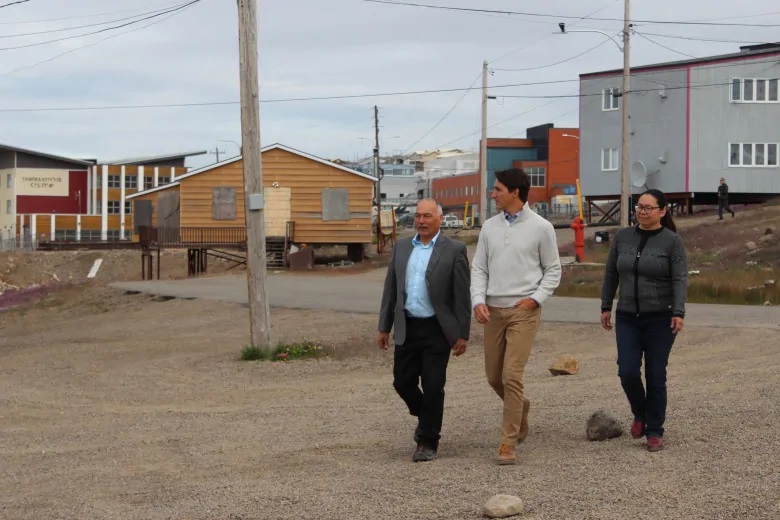Justin Trudeau rehashes old federal funding in housing announcement for Nunavut territory

Prime Minister Justin Trudeau rehashed the existing federal funding streams for housing in Nunavut in an announcement Friday morning in Iqaluit, in Canada’s eastern Arctic.
The announcement added up all the major housing commitments since Trudeau was elected in 2015.
To date, the federal government has given $200 million and promised nearly $510 million over the next nine years for the territory.
What was announced was the finalized paperwork — the Canada-Nunavut Housing Agreement — for money Canada has already committed to Nunavut as part of the National Housing Strategy announced in 2017.
It also sets out requirements for Nunavut to get the money, one of which is that Nunavut committed to keeping no less than 1,600 public housing units in use and maintained.
It also requires Nunavut to participate in talks to parse out the Canada Housing Benefit, which will allocate $4 billion nationally from April 2020 until 2028.
That benefit offers the potential for new money, but it’s not yet finalized.
Housing major concern
The Liberal candidate for Nunavut, Megan Pizzo-Lyall — who announced her candidacy officially Thursday alongside Trudeau — called the lack of housing a major issue for the territory.
Nunavut currently has a waiting list of nearly 5,000 people for public housing, and, with existing money, it will take 60 years to house those who currently need homes.
That figure does not account for the fact that Nunavut has Canada’s fastest growing population, and that during those 60 years some older units will become unusable.

Nunavut’s premier, Joe Savikataaq, thanked the prime minister while acknowledging Nunavut’s needs are far from met.
“Nunavut is a cold and harsh environment. It’s no place for anyone to be homeless,” Savikataaq said. “We also need transitional housing and homeless shelters.”
Where’s the money coming from?
All the federal money here comes to Nunavut through the Canadian Mortgage and Housing Corporation.
The largest chunk of funding, $240 million, was first announced in 2017 as part of the Northern Housing Initiative.
The territory received the first $24 million chunk of that in the 2018-2019 fiscal year, which ended in March.
Nearly $50 million comes from an even older Canada-wide funding scheme, which was called Investing in Affordable Housing (IAH).
In the last year of the Harper government, Nunavut got less than $9 million from IAH. This year, it got $49 million — a figure which the government of Nunavut is required to match.
The rest — around $245 million — comes from agreements from the 1990s when the federal government handed all public housing management over to the provinces and territories.
It promised to pay the mortgages on units it had, with the agreements ending as the houses are paid off.
Related stories from around the North:
Canada: Inuit housing strategy in Canada calls for local training to help solve crisis, CBC News
Finland: Report highlights Finland’s top 5 housing problems, Yle News
Russia: Abandoned Russian airbase to become wealthy residential neighborhood, The Independent Barents Observer
Sweden: Small town hopes to reverse depopulation trend affecting rural and Northern Sweden, Radio Sweden



